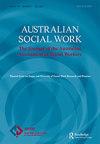Service Users’ Descriptions of Recovery-Oriented Elements of a Rural Mental Health Service
IF 2
3区 社会学
Q2 SOCIAL WORK
引用次数: 0
Abstract
Recovery-oriented practice is the dominant framework for mental health services in Australia. However, evidence demonstrating recovery processes outside public services is scant. This study explores how key processes from the Connectedness, Hope, Identity, Meaning, and Empowerment (CHIME) personal recovery conceptual framework related to service-user experiences of a rural mental health service during the COVID-19 pandemic. Qualitative telephone or video-conference interviews were conducted with 19 service users. Deductive and inductive data analysis was employed, applying the CHIME framework as a predetermined organisational structure. Themes were constructed according to the CHIME framework categories. The data reflected all five categories; connectedness and empowerment were salient. Participants’ service-delivery experiences could either enhance or hinder connectedness, the cultivation of hope, a positive identity, meaning in life, and empowerment. Nonclinical aspects of their experience were viewed as an extension of treatment. Opportunities exist for mental health practitioners to intentionally prioritise and strengthen recovery-oriented practice. Trauma-informed approaches are consistent with and complement personal recovery principles. Accountability structures are needed to monitor recovery-oriented practice in mental health settings. Family-focused interventions also need strengthening to build connectedness, meaning, and hope.服务使用者对农村精神卫生服务中康复要素的描述
以康复为导向的做法是澳大利亚精神卫生服务的主要框架。然而,证明公共服务之外的恢复过程的证据很少。本研究探讨了连接、希望、身份、意义和赋权(CHIME)个人康复概念框架的关键过程如何与COVID-19大流行期间农村精神卫生服务的服务用户体验相关。对19名服务用户进行了定性电话或视频会议采访。采用演绎和归纳数据分析,采用CHIME框架作为预定的组织结构。主题是根据CHIME框架类别构建的。数据反映了所有五类;连通性和赋权是突出的。参与者提供服务的经历可能会增强或阻碍联系、培养希望、积极身份、生活意义和赋权。他们经历的非临床方面被视为治疗的延伸。心理健康从业者有机会有意识地优先考虑和加强以康复为导向的实践。创伤知情的方法与个人康复原则是一致和补充的。需要建立问责制结构,以监测精神卫生机构中以康复为导向的做法。还需要加强以家庭为重点的干预措施,以建立联系、意义和希望。
本文章由计算机程序翻译,如有差异,请以英文原文为准。
求助全文
约1分钟内获得全文
求助全文
来源期刊

Australian Social Work
SOCIAL WORK-
CiteScore
4.20
自引率
16.70%
发文量
37
期刊介绍:
Australian Social Work is an international peer-reviewed journal reflecting current thinking and trends in Social Work. The Journal promotes the development of practice, policy and education, and publishes original research, theoretical papers and critical reviews that build on existing knowledge. The Journal also publishes reviews of relevant professional literature, commentary and analysis of social policies and encourages debate in the form of reader commentary on articles. Australian Social Work has grown out of the Australian context and continues to provide a vehicle for Australian and international authors. The Journal invites submission of papers from authors worldwide and all contributors are encouraged to present their work for an international readership.
 求助内容:
求助内容: 应助结果提醒方式:
应助结果提醒方式:


